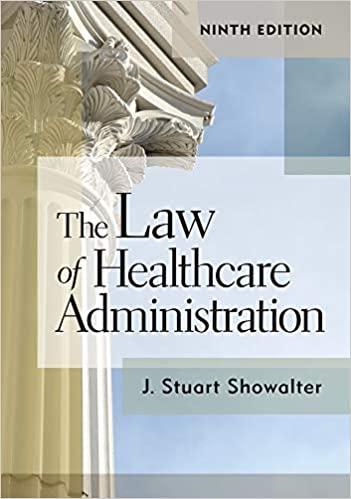Question
Police Officers commonly seize and search computers in connection with criminal investigations.Computer searches are different from ordinary searches for physical evidenceand usually requires a forensicexpert
Police Officers commonly seize and search computers in connection with criminal investigations.Computer searches are different from ordinary searches for physical evidenceand usually requires a forensicexpert to do the search.
A. It is well established that the Police must complete the search within 7 days.
B. Police have 30 days from the date of seizure.
C. Currently there are no clear rules governing the amount of time the Police may retain seized property.
D. Courts have ruled that more than one year is unreasonable.
10 Bob had his computer and digital camera seized under a valid warrant on January 1, 2015 seeking to prove that Bob had committed fraud. Bob pled guilty on January 15, 2016.On February 1, 2016 the forensic expert found illegal child pornography on both the computer and digital camera.Bob argued that the police had taken too long and the warrant was no longer valid since he had pled guilty to the fraud case.
Question 10 options:
The warrant was still valid and the evidence of child pornographyis admissible.
The warrant was issued for fraudulent information so is not valid.
Since the child pornography was found after the guilty plea it can not be used against Bob.
The cause of the warrant issue had been diminshed and therefore the incriminating information can not be used.
11 Digital evidence includes
Question 11 options:
Social media sites
Smart phones
Computer
All of the above
Question 12
Evidence that can be found on a computer include
Question 12 options:
Search history
Temporary files and cookies
deleted files
all of the above
Warrantless searches can be carried out in the following circumstances
Question 13 options:
Examiners convenience and time limitations
Permission anddanger of immediate destruction of evidence
Lead officer review and permission and exigent circumstances.
None of the above
Question 14(1 point)
In 2014 Riley v California the U.S. Supreme Court ruled that warrantless search and seizure of digital contents of a cell phone made during the course of an arrest
Question 14 options:
Are constitutional
Are unconstitutional
Are constitutional only if the phone is being used by the criminal atthe time of the arrest.
Constitutional if the phone is on the person at the time of the arrest.
Step by Step Solution
There are 3 Steps involved in it
Step: 1

Get Instant Access to Expert-Tailored Solutions
See step-by-step solutions with expert insights and AI powered tools for academic success
Step: 2

Step: 3

Ace Your Homework with AI
Get the answers you need in no time with our AI-driven, step-by-step assistance
Get Started


